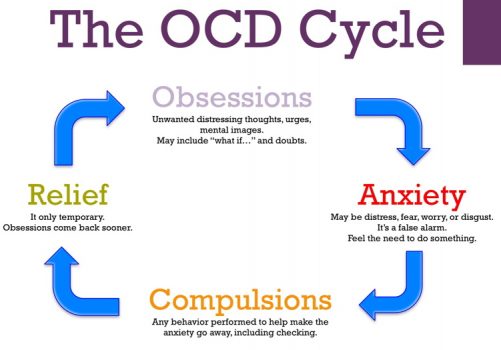Understanding Obsessive Compulsive Disorder (OCD)

Obsessive compulsive disorder (OCD) is an anxiety condition involving intrusive negative thoughts and the repetition of certain behaviours.
What is the difference between obsessions and compulsions?
Obsessions are thoughts or images which can be quite intrusive and distressing. Although these thoughts can often be irrational, they can be extremely difficult to ignore and result in overwhelming anxiety and fear. Common obsessive thoughts include consistent worry about forgetting to lock doors, something bad occurring, or fear of contracting germs. Obsessive thoughts can be infrequent, only occurring occasionally, and at other times they can occur frequently. Obsessive thoughts become problematic when they interfere in an individual’s daily functioning, personal relationships and/or employment.
Compulsions are the repetition of certain behaviours or actions with the aim of alleviating the fear or anxiety resulting from the obsessive thought. In other words, the compulsive behaviour neutralises the distressing obsession. This wouldn’t be problematic if the compulsion was simple however, many compulsive rituals can take up hours of each day. For example, an individual with the fear of forgetting to lock the front door of their home may check to see if their door is locked several times and may even return home whilst on their way to work, to double check that they did indeed lock the door. This can lead to being late for work and impede on reliability. Other examples of compulsive behaviours can include repetitive hand washing, counting/repeating, arranging, and checking behaviours.
Does an individual experience both obsessions and compulsions?
Most individuals who have OCD will experience both obsessions and compulsions however the two are not always present. 20 percent of individuals will experience obsessions only, and 10 percent will experience only compulsions.
Prevalence rates
About three in every hundred people will develop OCD at some time in their lives – that is more than 450,000 Australians. Depending on the severity of the symptoms, the person suffering from OCD may or may not seek or require support.
What causes OCD?
There is no one specific cause for OCD however it appears to be a contribution of several interacting factors, including genetic vulnerability, stressful life events, hormonal changes, and personality traits. This does not mean that if anxiety runs in the family, an individual will definitely develop the condition, they are just more susceptible to experiencing the condition. Environmental factors can also contribute to the development of OCD. An individual who is exposed to a highly stressful environment whilst growing up may be more prone to developing an anxiety condition.
What treatment options are available?
Treatment for OCD often includes medical and psychological intervention. Speak to your local General Practitioner for further information regarding medication options. Psychological counselling for OCD involves the use of evidence-based therapy such as Cognitive Behaviour Therapy (CBT) to assist in the management of obsession thoughts and compulsive behaviours.
If you have noticed any of the above happening in your life, why not give us a call today? Our team of highly skilled and well-experienced Psychologists are here to help.
For additional information on OCD, the following links may be helpful:
About the Author:

